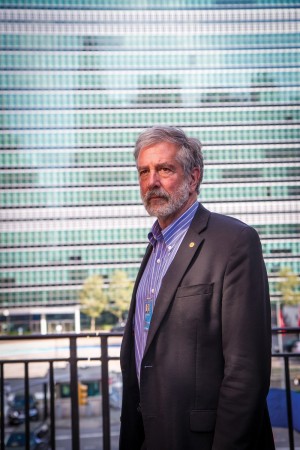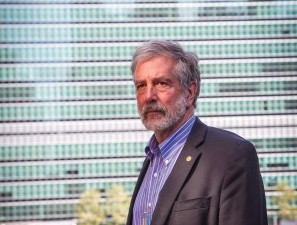by Rev. Paul Lansu
Senior Policy Advisor, Pax Christi International
To work on peace in one’s own society constitutes working on opportunities for everyone. Of central importance is the notion of human dignity for everyone. Human dignity and security are the same for everybody and shall be inclusive. It is important for every individual to experience leading a meaningful life. In order to do so, people require sufficient opportunity to think and act.
This reflection is based on the notion that our own society has both ‘domestic’ and ‘foreign’ elements: It is small, it houses a diverse array of people, languages and cultures, and it displays an open attitude to the world. Our own society is concerned both with domestic and global injustice. Our regions encounter tensions from abroad like (armed) conflicts between population groups through migration.
There are so many things that move us and that could shape concrete initiatives to strengthen democracy and peace in our own society. In order to contribute to peace in our own society in a meaningful way, we shall search the depth and the width of what moves us; through the ensuing peace spirituality, we shall make a difference in our society and in the international community.
From the experience of injustice to indignity
The road to peace in our own society starts with one’s own perception and experience of injustice, unfairness and immorality. A high degree of indignity accompanies this process. This human reaction can lead to passivity or activity and – in case of the latter – either to nonviolent action or to armed resistance (such as the new IRA[1]).
Radicalisation can be both violent and non-violent. To think radically can lead to radical behaviour. People can radicalise, with different outcomes as a result: From the Occupy movement to Al-Qaeda or IS (Islamic State). In the past, such as in the 1980s, we knew both radical extreme-right and extreme-left groups in Europe that did not shy away from the use of force. Left- and right-wing extremism continues to exist and religious fanaticism has become more visible.
It is important to systematically analyse why people radicalise. What is the situation? How do they think? How do they behave and how does this evolve? Society should seek to act preventively with regard to extremely radical behaviour.
It is important to be aware of feelings and sentiment as these can contain cues that something is not right. They point to possible problems in the environment that require attention. This indicative function of feelings is an important factor in human behaviour.
Political radicalism is the consequence of isolation and threats, which result in strong communal feelings among group members, but which also speaks of the experience of being excluded from the larger environment. Others are confronted with an unclear identity, perceptions of exclusion, humiliation, and direct experiences of discrimination, racism and exclusion.
Working toward social change
Our society is not perfect and requires a patient and consistent approach when it comes to working toward social change. Change starts bottom-up. If people feel like they are being treated unjustly and experience injustice within society, this can nourish forms of social unrest and can lead to a strong need for societal change.
We shall transform our individual or collective indignation into responsibility and action. Peaceful actions have the power to transform social questions, injustice and conflict into social change and they shall promote the common good. Most people are social beings who consider honesty and justice important and who want to do the right thing.
Aspects of social imperfections
The societal challenges that we see both in our own environments and globally are centred around poverty; employment; migration and asylum seekers; the use of social media and Internet; global warming and/or climate change. Gender inequality constitutes another problem: in many regards, women are being treated differently. This is a huge injustice that also hinders development: the productivity of many population groups is severely hindered because women are denied opportunities. Other examples, within Western societies, that require our attention concern sufficient educational opportunities for children and youth, as well as the ageing of the population (an ever-growing number of people gets older and older). Care is at the heart of society!
Quality of life
Our grounding principle is that all people should be treated equally, with equal respect. This concerns decent quality of life. Authorities should treat people respectfully and should refuse to humiliate them. Sometimes, some people require a bit more help and care, and they should be able to receive that. The means to the disposal of the authorities should be distributed as equally as possible among all citizens, yet with special care for the weaker and more vulnerable. People have to be taken seriously. In general, people want to participate in society.
A just distribution of goods and means is an important basis for peaceful coexistence. Human rights offer moral guidance that help the vulnerable against the powerful. Respect for human rights constitutes a ‘basic ingredient’ for peace and for nonviolent dealings with conflict.
A nation’s richness lies with her population and her quality of life. Human development should contribute to the creation of an environment that enables people to enjoy a long, healthy and creative life. Development is a dynamic concept and entails that things can improve. A simple and basic rule is that injustices should be decreased and eliminated.
Diversity is a treasure
Our world needs more critical thought and more respectful discussions. To think critically by entering into dialogue with others. Also in public debates, there needs to be respect for all people’s equal dignity. Diversity is a treasure. Uniformity is boring!
Philosophy’s Golden Rule goes as follows: treat others the way you want to be treated.[2] This regimen also dates back to the command of charity from the Biblical book Leviticus 19:18. People desire to be treated as full members of society and want to feel like their opinion matters. Of course, this is not solely about the rights but also about the responsibilities, that all people have with regard to humanity.
Freedom of opinion is a primary right, but it also comes with certain restrictions. Some freedoms limit others. It is for instance not allowed to incite violent extremism or to idealise terrorism.
There is much to do about civilians’ identity. Someone’s loyalty should in the first place lie with complete humanity and only then with his or her country, region, religion or family. Often, a Frenchman is first and foremost a Frenchman, and only then a human being! A Christian Palestinian is a human being first and then a Palestinian. All of us are human beings first and foremost.
Displaying loyalty or identity can take place secondly, with regard to ethnicity, religion, gender, and so on. Nations can be large and diverse. India alone is home to 320 languages and 1.2 billion people. Flanders has many different dialects and most of the larger cities are home to tens of different nationalities and a mix of Christian and other religions.
Religion and society
One’s religion does not automatically lead to radicalisation. The belief in a just world may provide meaning and direction. The convergence of state and religion is not a positive thing, especially not if it is codified in the constitution. No against state religion doctrine! No against religious ideology! But yes against a doctrine of freedom of religion that provides the necessary protection of human possibilities and equality with regard to religion.
The free practice of religion is a given. A situation in which a religious majority is dominant vis-à-vis religious minorities is an unhealthy situation. Here too, the rule states that all people should be respected, no matter their religion or ideology. Minorities require equal treatment. A democracy shall protect the rights of both its majority and its minorities. This requires decent governance by the authorities.
All religions and churches shall take their responsibility for society’s well-being, but they shall do this from a viewpoint of both critical reflection and distance. One religion cannot impose its rules and laws on a population, just like an ideology should not be able to do this.
Religion can provide extra value to a population’s growth and development. Religion – from the Latin relegare or ‘to reconnect’ – can inspire public life and can stimulate moral and social behaviour. This is closely related to reconciliation work, which means the restoration of relations – reconciliare or ‘to arrange anew’.
As meaningful frame and moral compass, religions often satisfy a wide array of fundamental needs, such as the need for meaning, social identification, connection, certainty and stability. It is true that some (ab)use religion to interpret it in a violent way and to promote violence. Religion cannot and should not be used to accept and justify the use of force.
Religious singularity can be used to work toward a pluralistic society. Freedom of speech, of association and of conscience, political access, and so on, are each crucial elements of a society that protects cultural and religious pluralism.
Humanitarian interventions
Sometimes, one’s society is violated within or by a democratic state. Democracies are not perfect either. Intervention may be considered, especially in failed states. Military and economic sanctions are only justified under certain grave conditions, for instance in case of a crime against humanity like genocide.
Even when such crimes take place, intervention may often be a mistake from a strategic point of view, especially when the country in particular is sufficiently democratic and can be convinced to reject its own actions. As long as there is a reasonable chance that the democracy in question can solve the issue, intervention by force is completely unwarranted.
However, authoritarian regimes where the mechanism to resolve such severe crimes is absent – for instance through suitable criminal tribunals – provide an altogether different context. Each person who is not safe in his/her own country or society has a right to protection. We shall reject indiscriminate use of force against civilians. There is a duty to guarantee all people’s safety. Authorities have the duty to protect their civilians. A secure society is a free society.
Emotions control people and policy
Civilians’ (peaceful) coexistence is dominated by emotions. Compassion is about empathetic concern, respect and solidarity. Compassion may never be used passively or selfishly. Compassion is only real once it is used actively and when it is directed toward other people. It is important to try and understand underlying emotions. Emotions can support policy that is aimed at furthering peaceful coexistence and the notion of human dignity and equality.
Conclusion: choose nonviolence
Democratic rules can bring about the nonviolent resolution of conflict. The authorities shall allow their citizens to act in accordance with their conscience, as long as this entails that they act according to democratic principles and to norms of nonviolence. Civil obedience is acceptable when it takes place in a public, conscientious and nonviolent manner.
Active nonviolence is a way of life and a way of treating others. We shall work towards a ‘warm’ society in which everyone is respected, no matter their beliefs or origins, a society free from prejudice, discrimination and repression. We shall cooperate with other religions and ideologies and work towards trusting one another.
____________








